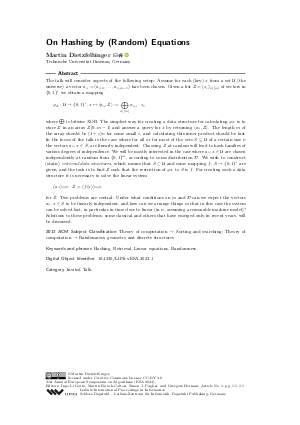On Hashing by (Random) Equations (Invited Talk)
Author
Martin Dietzfelbinger 
-
Part of:
Volume:
31st Annual European Symposium on Algorithms (ESA 2023)
Part of: Series: Leibniz International Proceedings in Informatics (LIPIcs)
Part of: Conference: European Symposium on Algorithms (ESA) - License:
 Creative Commons Attribution 4.0 International license
Creative Commons Attribution 4.0 International license
- Publication Date: 2023-08-30
File

PDF
LIPIcs.ESA.2023.1.pdf
- Filesize: 392 kB
- 1 pages
Document Identifiers
Subject Classification
ACM Subject Classification
- Theory of computation → Sorting and searching
- Theory of computation → Randomness, geometry and discrete structures
Keywords
- Hashing
- Retrieval
- Linear equations
- Randomness
Metrics
- Access Statistics
-
Total Accesses (updated on a weekly basis)
0Document
0Metadata
Abstract
The talk will consider aspects of the following setup: Assume for each (key) x from a set 𝒰 (the universe) a vector a_x = (a_{x,0},… ,a_{x,{m-1}}) has been chosen. Given a list Z = (z_i)_{i ∈ [m]} of vectors in {0,1}^r we obtain a mapping φ_Z: 𝒰 → {0,1}^r, x ↦ ⟨a_x,Z⟩ := ⨁_{i ∈ [m]} a_{x,i} ⋅ z_i, where ⨁ is bitwise XOR. The simplest way for creating a data structure for calculating φ_Z is to store Z in an array Z[0..m-1] and answer a query for x by returning ⟨ a_x,Z⟩. The length m of the array should be (1+ε)n for some small ε, and calculating this inner product should be fast. In the focus of the talk is the case where for all or for most of the sets S ⊆ 𝒰 of a certain size n the vectors a_x, x ∈ S, are linearly independent. Choosing Z at random will lead to hash families of various degrees of independence. We will be mostly interested in the case where a_x, x ∈ 𝒰 are chosen independently at random from {0,1}^m, according to some distribution 𝒟. We wish to construct (static) retrieval data structures, which means that S ⊂ 𝒰 and some mapping f: S → {0,1}^r are given, and the task is to find Z such that the restriction of φ_Z to S is f. For creating such a data structure it is necessary to solve the linear system (a_x)_{x ∈ S} ⋅ Z = (f(x))_{x ∈ S} for Z. Two problems are central: Under what conditions on m and 𝒟 can we expect the vectors a_x, x ∈ S to be linearly independent, and how can we arrange things so that in this case the system can be solved fast, in particular in time close to linear (in n, assuming a reasonable machine model)? Solutions to these problems, some classical and others that have emerged only in recent years, will be discussed.
Cite As Get BibTex
Martin Dietzfelbinger. On Hashing by (Random) Equations (Invited Talk). In 31st Annual European Symposium on Algorithms (ESA 2023). Leibniz International Proceedings in Informatics (LIPIcs), Volume 274, p. 1:1, Schloss Dagstuhl – Leibniz-Zentrum für Informatik (2023)
https://doi.org/10.4230/LIPIcs.ESA.2023.1
BibTex
@InProceedings{dietzfelbinger:LIPIcs.ESA.2023.1,
author = {Dietzfelbinger, Martin},
title = {{On Hashing by (Random) Equations}},
booktitle = {31st Annual European Symposium on Algorithms (ESA 2023)},
pages = {1:1--1:1},
series = {Leibniz International Proceedings in Informatics (LIPIcs)},
ISBN = {978-3-95977-295-2},
ISSN = {1868-8969},
year = {2023},
volume = {274},
editor = {G{\o}rtz, Inge Li and Farach-Colton, Martin and Puglisi, Simon J. and Herman, Grzegorz},
publisher = {Schloss Dagstuhl -- Leibniz-Zentrum f{\"u}r Informatik},
address = {Dagstuhl, Germany},
URL = {https://drops.dagstuhl.de/entities/document/10.4230/LIPIcs.ESA.2023.1},
URN = {urn:nbn:de:0030-drops-186545},
doi = {10.4230/LIPIcs.ESA.2023.1},
annote = {Keywords: Hashing, Retrieval, Linear equations, Randomness}
}
